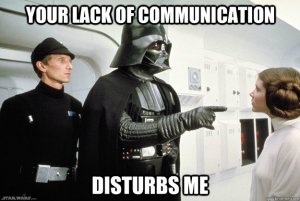I’ve heard so many times the saying that curiosity killed the cat. In French we say that quality is a naughty defect (generally to kids, in order to discourage it). That’s utter-bullshit, pardon my English. Curiosity saved men. It’s because we’re curious that we founds ways to compensate our tiny constitution, our ridiculous speed, our feeble health and so on. And it’s because we’re curious that we invented a special job: researcher. People devoted for the sole purpose of satisfying the curiosity of the society, and/or their own.
In return, the very minimum that these researchers can do, it tell the results of their investigations. Otherwise, that’s a bit unfair, no? It’s called staying in the Ivory Tower, the tower where intellectuals selfishly do their work, while staying disconnected from the society. We get paid by the society to find stuff, and we don’t tell what we find? Apart from fueling the lunatic nature of conspiracy theorists, who think every researcher in the world participate covertly to global machinations, this is just failing to do the full spectrum of our very responsibility as researchers. Every researcher should do popularization work, be it public conferences, press interviews, books or documentaries or just press release and let the journalists communicate for them. That’s the fair thing to do, and that’s also a very good exercise to be able to explain complicated concepts, and ultimately also to get more people interested in our discipline.
With that in mind, I’ve been popularizing quite a lot, since my very early carrier. I’ve written a piece about my thesis research during my first year of PhD, against the advice not to do so of my supervisor, who thought – like almost everybody else at the time – that popularization was the realm of bad scientists: those who where not sufficiently strong in research to stay with their peers went to shine with the public, pretending to be smarter than their colleagues knew them to be. Now I’ve written more, from articles to books, initiated several documentaries, participated in several others, given conferences in front of many different audiences, including about every age of school children, and interviews to radio, tv channels and written press. And apart from one or two exceptions, every single one has been a great experience.
In some countries, like my own, the public tends to think that researchers are at best immature society parasites who work on useless questions just because they can. In others, like the USA, they tend to have a better reputation, sometimes up to selfless saviors of the society. Regardless of the general view of our profession, communicating with the public is profitable for the public, is profitable for us and is profitable for our profession.
Of course, when I say communicate to the public, don’t go telling them all everything. We want to keep all our global conspiracies safely concealed, otherwise our secret plot to take over all the governments of Earth might be delayed…






















Hello! I would like to commend you for doing the rounds outside the ivory tower.
LikeLike